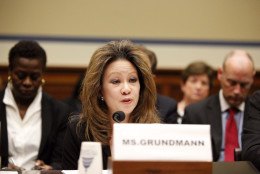Merit Systems Protection Board
-
Dealing with problem employees can help productivity and morale, and it can be done without extreme changes to the structure of the civil service.
October 26, 2017 -
Federal News Radio reporters Nicole Ogrysko and Meredith Somers cover the civilian agencies of the U.S. government. Together they bring a fresh and thoughtful approach to the stories from the federal workforce that are often overlooked.
October 19, 2017 -
The Veterans Affairs Department fires its D.C. medical center director, Brian Hawkins. This is the second time the department has attempted to fire Hawkins for "ineffective leadership."
September 20, 2017 -
Without action from the president, the National Council on Federal Labor-Management Relations will expire at the end of the month.
September 01, 2017 -
The VA secretary is not merely angry at the MPSB's recent request to reinstate Brian Hawkins, he's determined to fire him
August 10, 2017 -
Rep. Todd Rokita (R-Ind.) reintroduced the Promote Accountability and Government Efficiency (PAGE) Act after a similar bill died in the previous Congress. The legislation would give agencies the authority to remove or suspend new employees "without notice or right to appeal, from service by the head of the agency at which such employee is employed for good cause, bad cause or no cause at all."
July 24, 2017 -
Does the government fire enough people? Does it deal effectively with poor performers? Is the disciplinary and adverse action process effective? The answer to all three questions is probably no.
July 18, 2017 -
The Republic will continue to function if the MSPB lacks board members. But what about fairness and accountability?
June 28, 2017 -
It's been a busy couple of months for the Veterans Affairs Department. But VA Secretary David Shulkin said he wouldn't have it any other way. He's pushing the VA workforce to embrace risk and begin making bold, fundamental changes to the way it does business. He said he sees the VA Accountability and Whistleblower Protection Act as one bold change that will improve the department's employee morale and recruitment efforts.
June 20, 2017 -
The Veterans Affairs Accountability and Whistleblower Protection Act, which senators introduced last week, may have more momentum than previous bills. It now has 12 co-sponsors, including four Democrats and VA Secretary David Shulkin himself. Yet some federal employee groups and experts question whether the new bill has the teeth to truly tackle long entrenched cultural problems at the department.
May 16, 2017 -
Members of the Senate have reached a long awaited agreement on new accountability procedures for senior executives and employees within the Veterans Affairs Department. A bipartisan group of senators introduced the Veterans Affairs Accountability and Whistleblower Protection Act Thursday morning. It would change current disciplinary appeals rights for both SES and rank-and-file employees.
May 11, 2017 -
The U.S. Court of Appeals for the Federal Circuit upheld an appeal from Sharon Helman, the former director of the beleaguered Veterans Affairs medical center in Phoenix, Arizona, who was fired in 2014. The court said a key provision that lets VA more quickly fire and discipline senior executives is unconstitutional. The Merit Systems Protection Board will review the original decision an administrative judge made regarding Helman's removal.
May 09, 2017 -
Some advocates of the House Veterans Affairs Committee's new employee accountability bill say it's different enough from previous attempts to tackle this issue and should assuage past concerns. But others fear the legislation revives familiar worries.
March 03, 2017 -
Agency culture and a poor understanding of the disciplinary process are some of the biggest challenges supervisors, managers and senior executives said they face when trying to fire an employee for misconduct. The Merit Systems Protection Board surveyed 10,000 federal managers about their understanding and opinions of civil adverse action procedures.
February 14, 2017 -
The Merit Systems Protection Board had a productive 2016, but the departing MSPB chairman, Susan Tsui Grundmann, warned of several budgetary, legislative and personnel challenges that could impact the agency's future.
January 18, 2017














